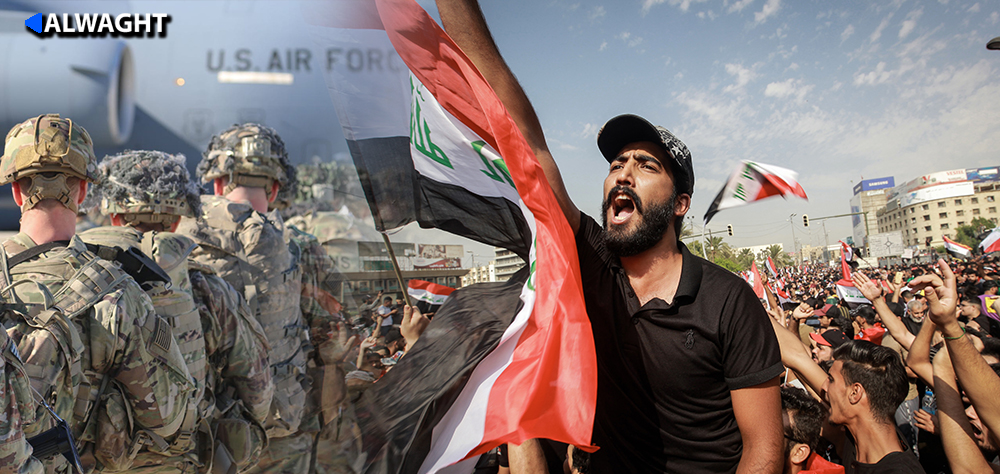Alwaght- As Iraq moves forward to the early elections on October 10, making general demands and forming coalitions by the political groups present themselves as the top obsessions of the nation’s politics.
In the past parliamentary elections, specific demands were made by various sides. The upcoming election is no exception, with the political factions raising major social demands.
In the past two years, one of the most important priorities of Iraqi citizens, or even their top priority, has been improving the economic conditions or what the analysts name “economic-centered discourse.” However, it became clear that in recent months the pro-independence and sovereignty discourse and the need to shore it up topped demands on the Iraqi political scene.
Iraqi political factions highlight need for saving sovereignty and expelling foreign troops
With just six months left to the snap parliamentary elections in Iraq, the political factions in the country embrace more than ever pro-independence discourse and underscore the need to confront violations to Baghdad's sovereignty. In recent months, leading figures like Saerun leader Muqtada al-Sadr, Fatah leader Hadi al-Amiri, and State of Law leader and former Prime Minister Nouri al-Maliki underscored the necessity to implement the foreign troops expulsion bill of the parliament that was approved on January 5, 2020. The bill ratified two days after the then US army, with the direct order of the then US president Donald Trump, assassinated two anti-terror commanders, Iran’s General Qassem Soleimani and Iraq’s Abu Mahdi al-Muhandis, at Baghdad International Airport in a flagrant violation of the Iraqi national security and sovereignty.
What started by the Iraqi parliament is now raised strongly again by the Iraqi political game-changers. For example, recently Faleh al-Fayadh, the commander to the Popular Mobilization Forces (PMF), or Hashd al-Shabbi locally, in an address commemorating one of its martyred commanders asserted: “The presence of foreign forces on the Iraqi soil is a violation of Iraq’s national sovereignty. War, sacrifices, and martyrdom all serve the sovereignty which makes sense with the foreign forces withdrawal. We fight, and present martyrs to ensure our country’s sovereignty.
Pointing to the “decisive” conditions the country is living in an annual convention of the National Wisdom Movement, Sayed Ammar al-Hakim mentioned the challenges Iraq passed and those it has ahead. He said the first challenge is maintaining the vital gains by strengthening the territorial sovereignty via expelling the foreign forces.
“This is achievable with three nos: no to combat forces, no to permanent military bases, and no to foreign intervention in Iraq’s home affairs,” said al-Hakim.
Why are Iraqi political parties increasingly cherishing security and independence?
As the expulsion of foreign forces and emphasis on the national sovereignty maintenance are taking shape as the top election discourse in Iraq, the question is that why such demands are gaining momentum more than ever.
Four reasons may stand as driving forces behind this brewing discourse in the Iraqi politics.
1. Eighteen years after the liberation of Iraq from the dictatorship of the Ba'athist party, foreign presence and intervention, like a great damaging factor, have always threatened the sovereignty and the political community of new Iraq. At first, it may have seemed that the US occupational force presence was limited to a few years, but now it has become apparent to Iraqi public that the West, led by Washington, is trying to extend its military presence in Iraq and even build permanent military bases there, while its presence brought nothing but insecurity and instability.
2. The involvement of the US and Europe in ISIS rise in Iraq, as well as their efforts to divide the country by promoting the independence of the Kurdistan region in the north from the center and south, have made the Iraqi political community aware that Washington and US strategists are working to undermine Iraq's national interests and security. This encourages demands, both from people and political factions, for foreign military withdrawal among other election demands. The certainty is that any party embracing this discourse will make wider popular basis.
3. Mustafa al-Kadhimi government’s tolerance with the presence of foreign troops has been another key factor promoting pro-independence demands in the Iraqi society. Walking on an opposite path to people, PM al-Kadhimi during over a year of holding the post did not take the smallest moves to implement the binding bill. In some cases, he crossed the ordinary lines of tolerance with the Americans, sparking anger of the politicians.
All in all, the course of the political developments is increasingly aligning with the opposition to the uninvited foreign presence. Contrary to al-Kadhimi’s tolerant spirit and practices, many political factions and an overwhelming majority of the people mark the national sovereignty and independence as a red line respected only with immediate foreign military withdrawal.



























